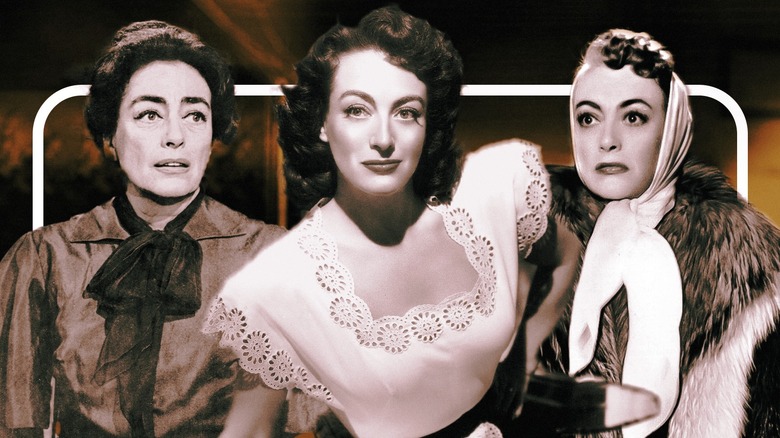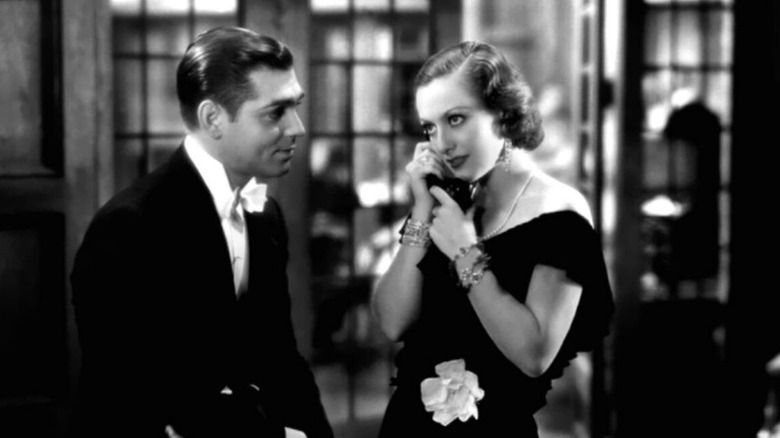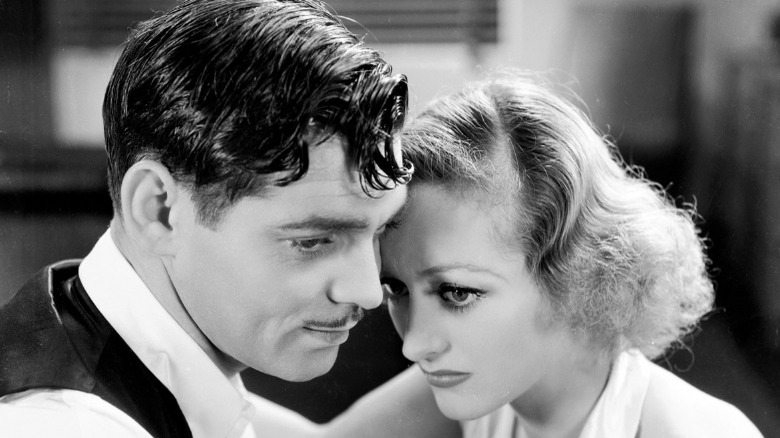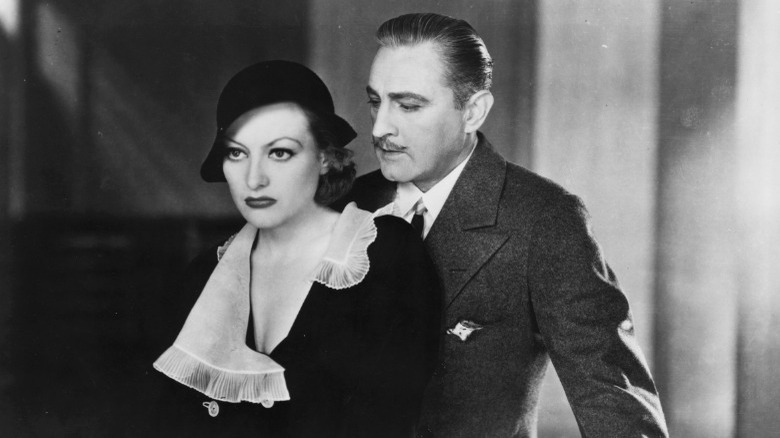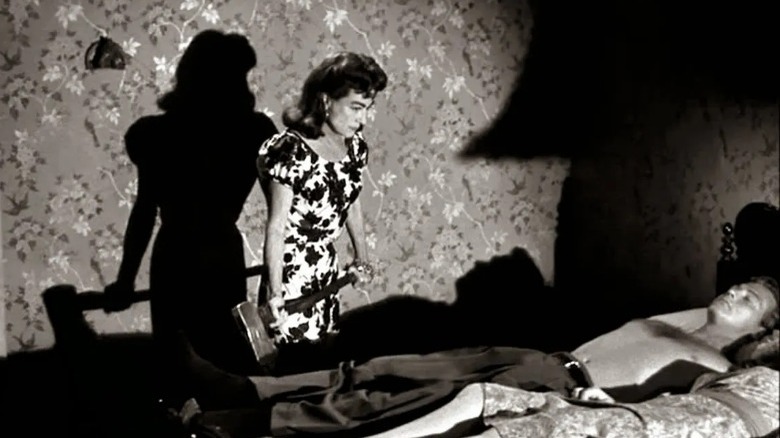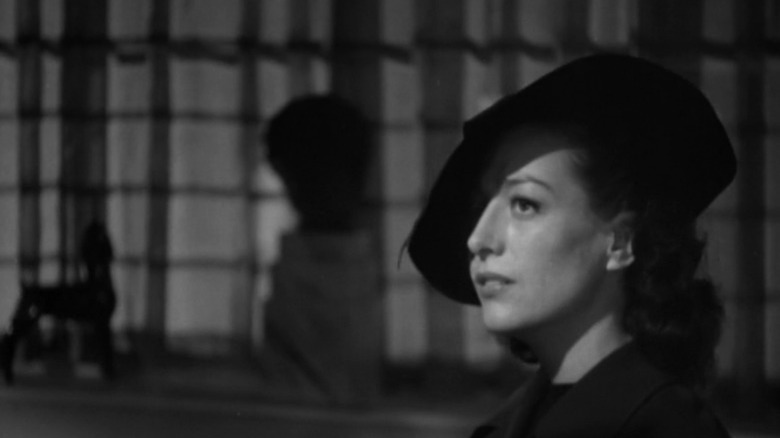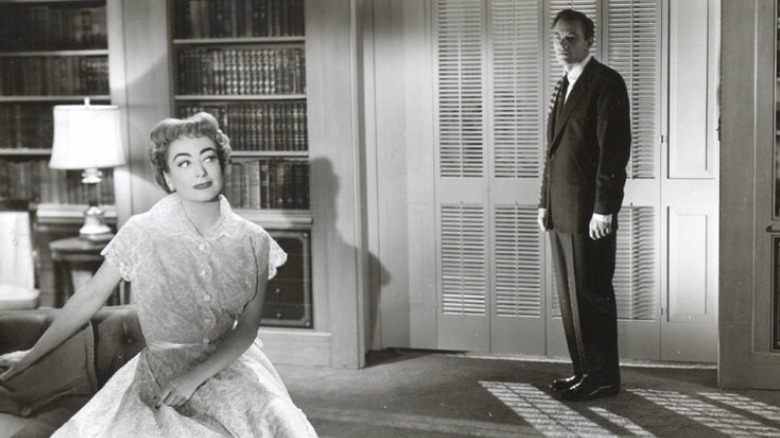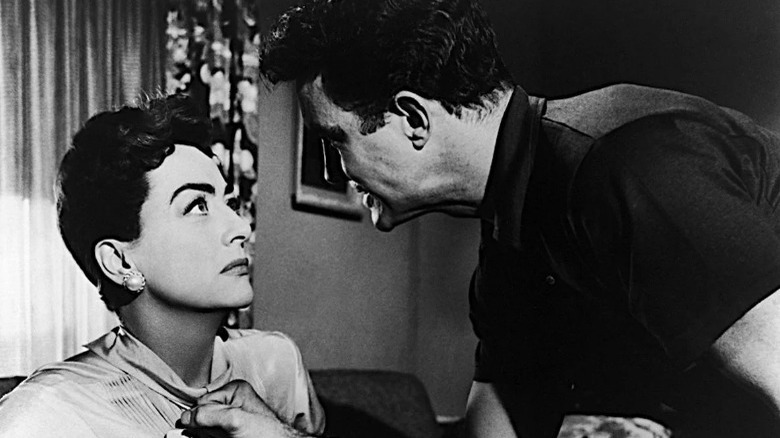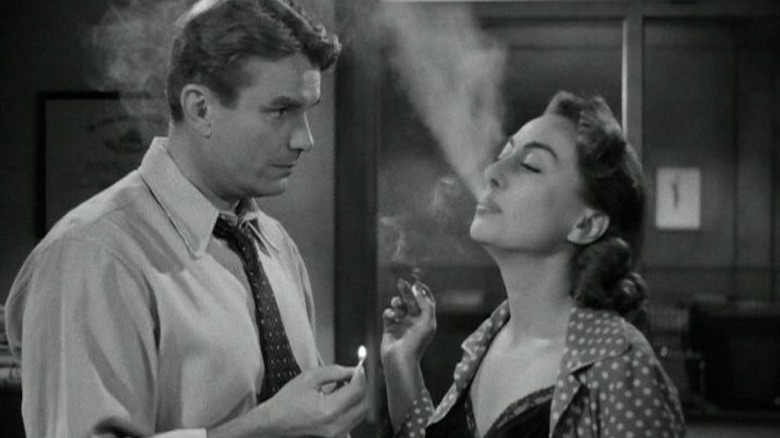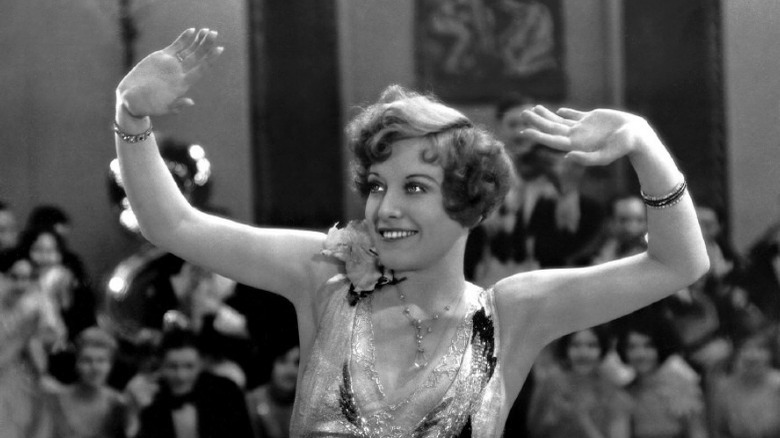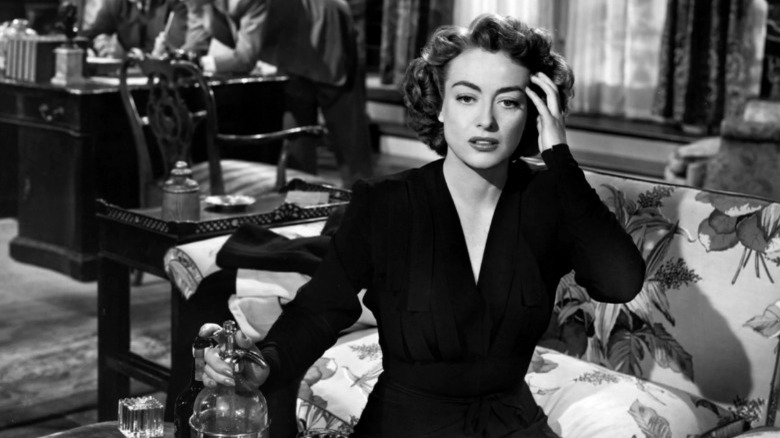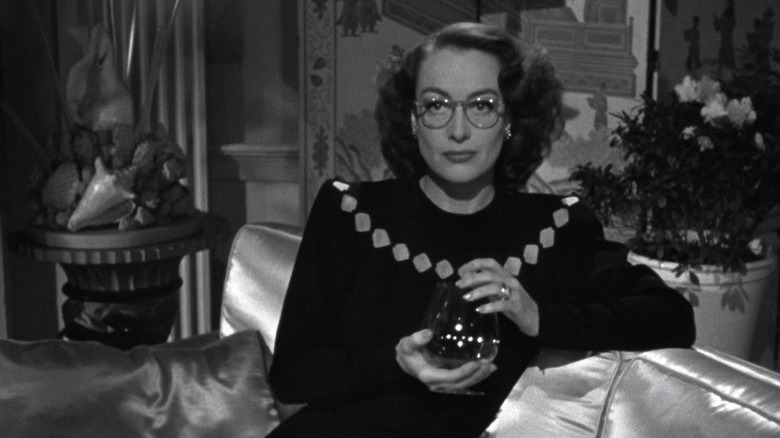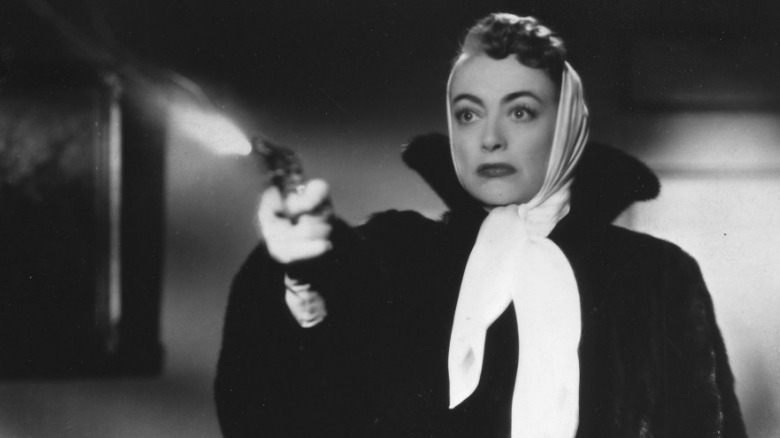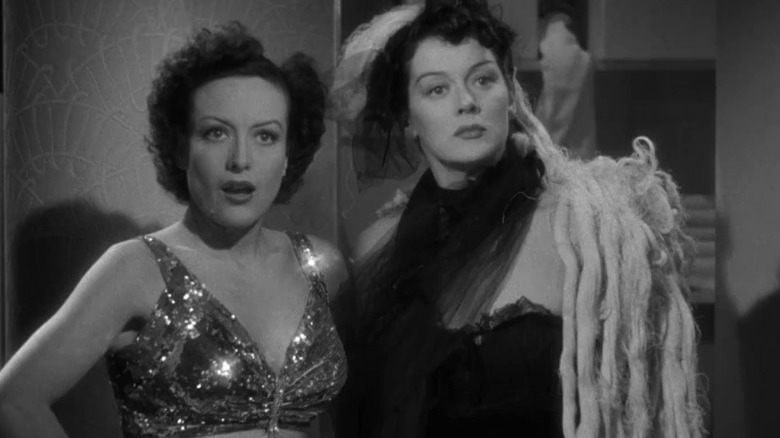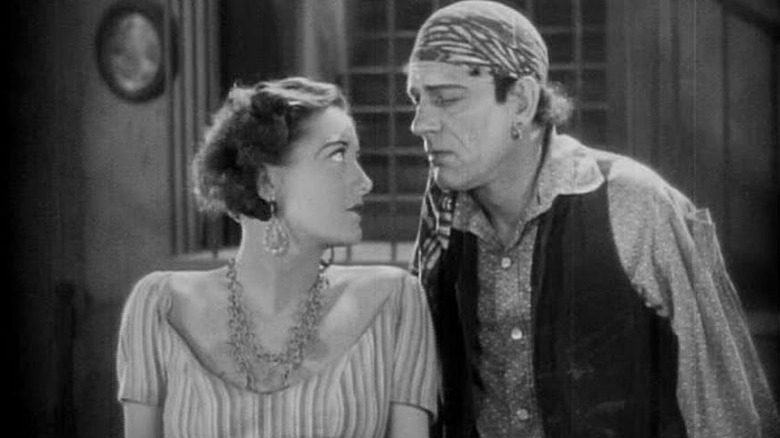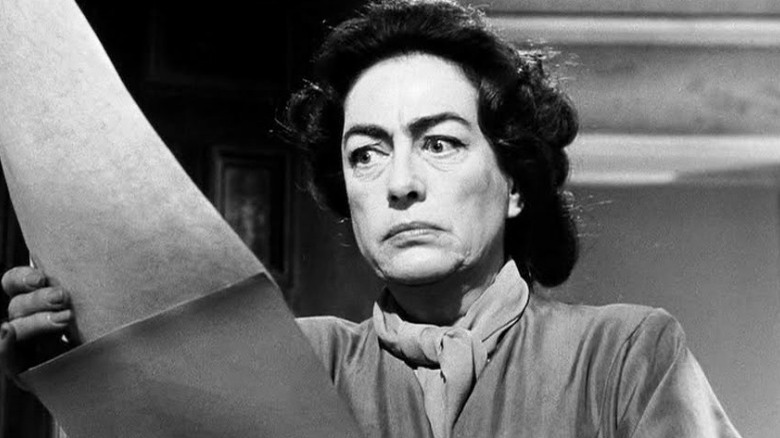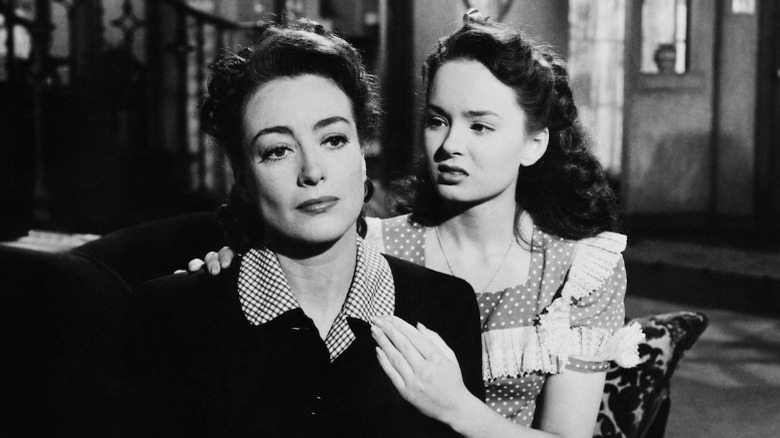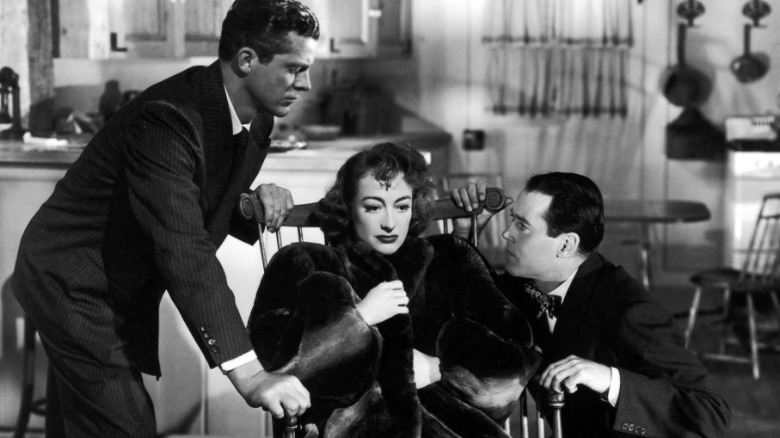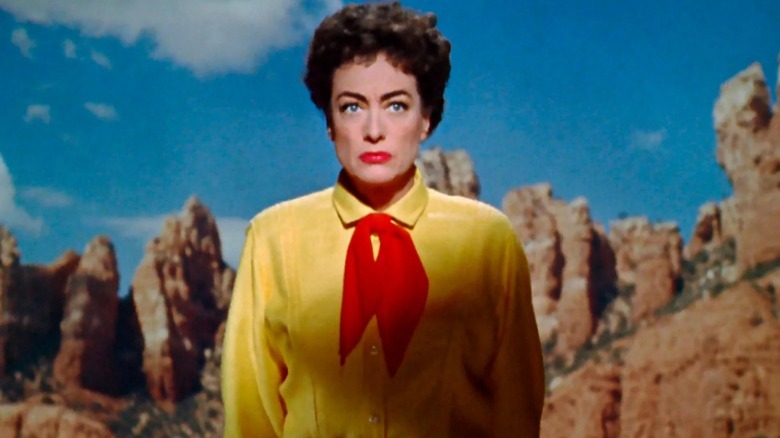The 18 Best Joan Crawford Movies, Ranked
Few names in Hollywood's illustrious history get people talking quite like Joan Crawford. The legendary actress began her career in silent films before transitioning to sound, and worked for decades, appearing in more than 80 films and television shows. However, the images conjured up of Crawford these days are rarely of her — instead, they're of Faye Dunaway, who played a diabolical and utterly maniacal version of the actress in "Mommie Dearest," That 1981 film — based on a shocking book from Crawford's daughter Christina — changed Crawford's reputation forever and all-too-often erases her stature as one of cinemas greatest stars.
That is nothing short of a tragedy. Few actors could match Crawford's talent, determination, and tenacity. Indeed, even after she retired and then passed away in 1977, very few have matched her prodigious abilities. It can be difficult to look past her domineering facade (especially in a post-"Mommie Dearest" world), but doing so reveals that nobody did it like Crawford. Choosing her most memorable films was no easy task — it pained me not to include films like "Strange Cargo," "Flamingo Road," and "Harried Craig," or even the vastly underappreciated "Berserk." No matter what the situation, she never gave anything less than her all. Here are Joan Crawford's very best movies, ranked.
18. Possessed (1931)
Joan Crawford and Clark Gable shared a torrid history, collaborating on eight films, while reportedly maintaining an on-again-off-again affair for years. Their third film together, 1931's "Possessed," directed by Clarence Brown and written by Lenore J. Coffee, finds Crawford playing a working-class factory worker named Marian, who lives within her means but longs for something better — something finer — in life. After a chance encounter with a wealthy train passenger passing through, she heads to New York, where she meets the man's friend Mark (Clark Gable). Mark gives Marian the sophistication she's longed for, providing her with glamorous outfits and a vital cultural education. Marian loves Mark, but he keeps her at a distance, giving her a new name and backstory to draw off busybodies. He later embarks on a political career and their relationship proves problematic.
At 76 minutes "Possessed" seems rushed, and opportunities to dive further into these characters and their situations are left unfulfilled. Still, Brown and Coffee take a familiar story and spice it up with some genuine surprises, and Gable and Crawford's chemistry is so palpable that more time would have really amplified the proceedings.
17. Dancing Lady
Another collaboration between Crawford and Gable, "Dancing Lady" rates as a fairly standard let's-put-on-a-show musical, filled with panache and exuberance. Crawford charms as Janie, a woman possessed by a desire to dance above all else. Janie is discovered at her burlesque job by a wealthy man impressed by her potential, and he introduces her to bigwig stage director Patch Gallagher (Gable). Janie totally reveres Patch's notable talents, but he sees little in her. Janie then decides to use her so-called feminine wiles to crawl her way to the top. Crawford delivers the goods, and what a pleasure to see her underutilized dancing skills take center stage.
The film even serves up the first-ever screen appearance of the legendary Fred Astaire, who dances and sings alongside Crawford in the silly and joyful number "Let's Go Bavarian" — which features Astaire in a pencil mustache and Crawford in blonde pigtails. A fun, if slight affair, "Dancing Lady" nevertheless packs plenty of pre-code entertainment and excitement. It also makes time for The Three Stooges, as well as Crawford's second husband Franchot Tone.
16. Grand Hotel
"Grand Hotel. Always the same. People come. People go. Nothing ever happens." That observation opens — and closes — Edmund Golding's 1932 film. It is, of course, laced with irony, as an awful lot happens at the esteemed Berlin hotel: gambling, theft, romance, fights, and even murder. Some dreams are made a reality, and others crushed. And that occurs in just a couple of days. The film boasts one of the most legendary ensemble casts ever assembled. Greta Garbo, John Barrymore, Lionel Barrymore, Wallace Beery, and Crawford come together in a Who's Who of early Hollywood, and the results often dazzle. Crawford enchants as Flaemmchen, a stenographer struggling to make ends meet. She finds the escape she desires in the arms of a Baron (John Barrymore) — but he himself has fallen head over heels for a ballerina (Greta Garbo). To make matters worse, the Baron's exceptional wealth is an illusion, and he desperately needs cash.
Crawford played numerous characters dealing with unrequited love, and many of the films/roles on this list fit that bill. Nobody portrays a tortured lover like Crawford. Flaemmchen's eyes betray longing and her lips tremble as her dreams are thwarted yet again. The fire in Crawford's eyes lets you know this one struggle won't define Flaemmchen, and for her, life is just beginning. "Grand Hotel" also holds the remarkably unique distinction of being the only film to win the coveted best picture Academy Award without earning a single other Oscar nomination.
15. Strait-Jacket
"Strait-Jacket" starts with a bang — or rather, a blood-curdling scream. This hugely entertaining horror finds Crawford leaning into the sterner parts of her persona. She plays Lucy Harbin, who's been away in an asylum for 20 years after butchering her husband and another woman with an axe: right in front of her young daughter Carol (Diane Baker).
But now Lucy is back, and her daughter and those around her aren't sure what to make of Lucy's return. She finds her adjustment back to reality challenging: one moment she fears for her life, and at the flip of a switch, she bursts with confidence and flirts heavily with her daughter's boyfriend. There's something undoubtedly sinister afoot; Lucy cannot escape the voices in her head, and beheadings start to occur. Director William Castle earned renown for his horror opuses, and he also displayed a real knack for capturing the humanity of his characters underneath all his publicity stunts and theatrical shenanigans.
There's simply no role Crawford wouldn't bring her all to; she even acted her heart out in her final film, "Trog." Thankfully, "Strait-Jacket" is leagues better than that sci-fi dreck, and the role of Lucy Harbin allows her to access every facet of her abilities, from the meekness of "Baby Jane" to the ferocity of "Queen Bee." She comes through with a bravura performance that serves as a strong reminder that Crawford always remained at the peak of her performing powers. She commands every moment of "Strait-Jacket" and will leave you mesmerized through the shocking twists and ghoulish delights.
14. A Woman's Face
After an accident results in considerable facial scarring, Anna Holm (Joan Crawford) finds herself in a world of criminal activity. A ruthless blackmailer, Anna uses large hats to hide her face, preferring to lurk in shadows rather than allowing herself to be seen. But when she meets a surgeon who can eliminate the scars, Anna sees an opportunity to start over — if she can resist the criminal underworld she's become so accustomed to.
"A Woman's Face," directed by George Cukor, often insightfully glances into the suffocating beauty standards women experience. A sharp contrast reveals itself both in the way people treat Anna before and after her surgery to remove her scarring, as well as the way she carries herself before and after her intensive operations. Men who once mocked and scorned her for her scars now covet her — but Anna only seeks to please Torsten (Conrad Veidt). She craves his approval and love, but Torsten is a callous man, whose initial likability gives way to something far more wretched. In the crushing attic sequence, Torsten behaves cruelly to her, reminding Anna that he fell for her before the surgery, and that only he could possibly love the real her.
Crawford so often shone in big, bold moments, shouting or screaming to command attention. But Anna offers something different — an opportunity to revel in subtle looks and smiles that illuminate her characters' interiority. "A Woman's Face" frequently dips into implausible territory, making it tough to take seriously, and it veers too hard into melodrama as well. Still, Crawford and Veidt are so tremendous that those issues fall by the wayside.
13. Queen Bee
There's something absolutely tantalizing about a grand Hollywood actress getting the opportunity decades into their career to play a complete and utter monster. Bette Davis looked like she had the time of her life doing it in 1968's "The Anniversary," and Crawford seemed to equally relish the chance in 1955's "Queen Bee."
Crawford puts forth a titanic presence as Eva Phillips. People are kind to Eva, as her ability to lure you in with kind words and gestures is unparalleled. But when Eva doesn't get her way — in this case, her sister-in-law is engaged to be married to someone Eva doesn't care for — watch out, because her vicious, narcissistic, and controlling side comes out, and once it rears its head, you better believe it isn't going anywhere. The dialogue is frequently silly and over-the-top, but Crawford is so convincing you can't help but feel terrible for all her victims that stand at the other end of her acid tongue.
Director Ranald McDougall's ludicrously mean-spirited melodrama finds Crawford at her most cutting — yet most glamorous, including a truly epic descent down a luxurious staircase. It's impossible to look away from Crawford in this film — her rage is searing and unpredictable, and you never know what her character will do next, which keeps the tension and excitement sky-high. The film is perhaps best described as a guilty pleasure. I have doubts as to whether "Queen Bee" is actually particularly good, as it's all a bit mindless– but few movies are more fun.
12. Autumn Leaves
Written by blacklisted husband and wife pair Jean Rouverol and Hugo Butler, the psychological drama "Autumn Leaves" marked the first teaming of Crawford and director Robert Aldrich. The film borrows the title of the popular song "Autumn Leaves," (sung by Nat King Cole) and you can hear it several times throughout the movie. Interestingly, the song has virtually nothing to do with the story itself. Instead, "Autumn Leaves" is a cautionary tale about the things that happen when you marry someone before you really get to know them, which in itself provides an amusing critique of characters in Hollywood movies, who tend to get married at the drop of a hat.
Milly Wetherby (Crawford) hungers for companionship and a love that's eluded her for her whole life. She doesn't get out much, working alone and from home as a typist. In an effort to put herself out there — thoughts of living as a spinster torture her — Milly heads out to a diner. It's there she meets veteran Burt Hanson (Cliff Robertson). The two spark quickly, though Milly believes herself too old to be with Burt. Burt won't give up easily, however, and Milly agrees to his proposal of marriage, and things get increasingly unpredictable from there.
"Autumn Leaves" received pretty brutal reviews when it was first released and critics quickly derided it as camp, but the film is now widely recognized as a powerful movie about the romantic relationship between an older woman and a younger man — something rarely seen in cinema.
11. The Damned Don't Cry
Ethel Whitehead's (Crawford) husband is a nightmare. Seriously, her husband is awful with a capital A, viciously berating Ethel for things like buying a bicycle so he could have something to enjoy. After a devastating loss and deflated by exhaustion from her miserable life as a housewife unable to bring any happiness to her miserable, nasty husband, Ethel leaves her humdrum life to become something great. "I want something more than I've got out of life, and I'm gonna get it," Ethel tells her family. And she has no idea just how right she is.
Ethel twists her frustrations into an obsession — she aspires to be at the very pinnacle of society. She uses men to propel herself forward. "The only thing that counts is that stuff you take to the bank," she tells one of her pawns. Just as a male gangster would wield a gun as a weapon, Crawford's character must wield her sexual prowess like a weapon. Climbing the social ladder, Ethel emerges as Lorna Forbes, and gets closer and closer to tremendous wealth and power — but to achieve it, she finds herself entangled in a sinister crime syndicate. "The Damned Don't Cry" has a lot of interesting things to say about gender roles and the challenges of operating within them to achieve the improbable. It might be over-exaggerated and some characters are thin, but it works.
10. Our Dancing Daughters
While "The Unknown" provided a breakthrough for Crawford, 1928's "Our Dancing Daughters" transformed her into a superstar. The actress signed her first contract with MGM as a dancer in 1925, but was largely confined to uncredited bit roles until "The Unknown." In "Our Dancing Daughters," she assumed the starring role and showed off her tremendous dancing abilities. Crawford is luminescent as Diana 'Di' Medford, a vibrant flapper who loves nothing more than to charleston the night away at jazz clubs. Despite her external confidence, deep down Di takes her virtues seriously, and dreams of a romance with the perfect gentleman. Adrift on the moral compass is her pal Ann (Anita Page), who prefers to be with men for their money rather than love.
Harry Beaumont's film brims with exuberant energy and the excitement of an era that lived in glorious excess — just a year before everything came crashing down in the Great Depression. The film is mostly silent but makes use of new (at the time) technology: a synchronized soundtrack, though there is no audible dialogue. Crawford truly personified the flapper, so much so that F. Scott Fitzgerald, author of "The Great Gatsby," said, "Joan Crawford is doubtless the best example of the flapper, the girl you see in smart night clubs, gowned to the apex of sophistication ... Young things with a talent for a living."
9. Possessed (1947)
Fun fact: Crawford starred in two different movies titled "Possessed," the first opposite Clark Gable in 1931. Interestingly enough, 1947's "Possessed" is an entirely different movie, bearing no relation to the early '30s flick. It's also a considerably better one, and a compelling and thoughtful look at mental illness.
Crawford stuns in an Oscar-nominated role as Louise, who works as a nurse for a disagreeable older woman, who's married to a much kinder man, Dean (Raymond Massey). But Louise sets her sights on a very different man: Dean's neighbor David (Van Heflin), who ultimately turns down Louise. This completely devastates her, and while she tries to move on with her life, her utter obsession with David threatens to consume not only herself but those around her. Crawford interprets the role with her usual dramatic flair, but also a sensitivity. It's clear she cares deeply about her character Louise, and she manages to make falling for David, a most unlikable character, completely believable.
The script ingeniously implements some impressive sleight of hand to keep tensions and entertainment high: people's intentions are often a mystery, and even after the film wraps some ambiguity remains — a rarity for a film of the era.
8. Humoresque
Crawford inspires awe in "Humoresque" as Helen Wright, an exceptionally wealthy socialite unsatisfied with her life. Helen is stuck in a marriage without joy (her third), and bogged down by personal demons. Men typically don't mean much to her beyond casual amusement, though something shifts when she hears Paul Boray (John Garfield) on the violin. At first an entirely professional arrangement — Helen helps to turn Paul into a star — but soon enough her passion gets the better of her. She realizes that romantic feelings are developing, but Paul's professional career and passion for his work threaten to undo everything.
Garfield, known for angry, brooding characters, plays against type as a classical violinist, though the character still maintains the working-class background that defined so many of his roles. While best known as the boxer in "Body and Soul," Garfield more than rises to the occasion in "Humoresque," performing alongside Crawford convincingly.
While some may dismiss "Humoresque" as a lesser riff on "A Star is Born," that would be a mistake. Jean Negulesco's film is a visually stunning, emotionally potent melodrama that features an astonishing performance from Crawford, displaying steeliness and immense vulnerability in equal measure, complemented by a powerhouse Max Steiner score. It also offers a rare opportunity to see one of cinema's great divas wearing glasses.
7. Sudden Fear
A movie that certainly earns its title, 1952's "Sudden Fear" is an outstandingly tense thriller. Crawford shines as Myra Hudson, a successful playwright. After initially refusing actor Lester Blaine (a chilling Jack Palance) for a role in one of her plays, she meets him on a train and falls for him, and the pair marry soon after. Completely smitten, Myra starts to adjust her will to include her beloved Lester, but soon realizes that her adored husband has very different plans for their marriage.
The scene in which Myra discovers her husband's true intentions is a tour-de-force. Myra accidentally left her dictating machine on overnight and plays through the recording, listening to her notes from the night before. Her jovial attitude is a joy to behold, but moments later she hears a conversation her husband has with Irene (Gloria Grahame). The ecstatic happiness drains from her face, replaced by absolute devastation when Myra discovers her husband despises her, and then unfiltered dread upon the revelation that they're planning to kill her for her considerable fortune. Director David Miller wisely keeps the camera on Crawford's expressive face. She doesn't say a word, but you can tell exactly what she's thinking. It never once feels over the top, and it's the kind of scene that should be pored over by prospective actors. It's no wonder she received an Oscar nomination — and frankly, she should have scored her second win.
6. The Women
Classic Hollywood offered limited opportunities for women, who were often saddled with two-dimensional characters. Director George Cukor cannot be tagged with such accusations. Cukor directed "The Women," which not only provided a variety of interesting female characters for some of Hollywood's best actresses, but it showcased no men. Yep: while the film's poster declared "It's all about men!" there is, in fact, not one man in this all-female cast.
Crawford shines as Crystal Allen, a character whose name even sounds like a grande dame diva. Crystal is a kept woman, thanks to an affair with Steven, husband of Mary Haines (Norma Shearer). When Mary confronts Crystal, Crawford revels in delivering line after line of witty, acidic dialogue (courtesy of the wonderful screenplay by Anita Loos and Jane Murfin). "I know Steven couldn't love a girl like you," Mary claims. "Well, if he couldn't he's an awfully good actor," Crystal responds with exceptional confidence. Crystal seems utterly unfazed by Mary's confrontation. Attempting to exit with the upper hand, Mary offers some (not-so) helpful advice: "If you're dressing to please Steven, not that one. He doesn't like such obvious effects." "Thanks for the tip," Crystal snaps back, "but when anything I wear doesn't please Steven, I take it off," enshrining herself as a legendary villain with a single line.
5. The Unknown
Crawford effortlessly transitioned from silent cinema to the talkies, something that was notoriously difficult to do. But before she emerged as one of Hollywood's most sought-after stars, she broke through in 1927's silent film "The Unknown." Directed by the terrific and always-exciting Tod Browning, the horror film established Crawford as a legitimate force in movies. Interestingly, despite horror properly launching her career, Crawford wouldn't return to the genre for decades.
This frightening film takes place in the world of the circus. Crawford stars as Nanon, who performs alongside Alonzo the Armless (Lon Chaney), who uses his feet to throw daggers at her in a routine that delights and astounds audiences. Alonzo loves Nanon, something he keeps from her. There's a good reason for that. He harbors a far more sinister secret: he isn't actually armless and in fact is a killer on the run from the police. Over the film's brief 62-minute runtime, Alonzo goes to extraordinary and excruciating lengths to win Nanon's heart, including murder and amputation. "The Unknown" expertly keeps the tension taut throughout, and Chaney – unmatched when it comes to playing cinemas' creepiest men — is a sensation. Crawford brings exceptional vibrancy and energy to the role and even shares convincing chemistry with the terrifying killer. Crawford's a sight to behold, and it should come as no surprise that this role catapulted her into one of cinema's most impressive careers.
4. Whatever Happened to Baby Jane?
The 1960s brought difficult challenges for Crawford, as her megawatt star power completely faded. The same was true for her eventual co-star Bette Davis, as the two were no longer considered bankable. That seems utterly absurd today, but Hollywood's prejudice against older women has never gone away — and was considerably worse in the '60s than now.
It turned out studio bigwigs were wrong. The combination of Davis and Crawford proved resolutely bankable. Robert Aldrich's "Whatever Happened to Baby Jane?" was an enormous success, earning an amazing $9 millon. The film offered incredibly rich roles in its horrifying tale of former child stars now living in a dilapidated mansion. Crawford embodies Blanche, the older sister who had a successful career before getting paralyzed from the waist down.
Often an actress cast in roles of impressive strength, it's fascinating to see Crawford retreat into such a meek, shy, frightened character — and to do it so successfully. If it was 20 years earlier, I couldn't imagine Crawford taking a role so against type, but with nothing to lose, Crawford threw absolutely everything into her performance as Blanche, and it's one of her finest.
The behind-the-scenes drama that unfolded during the film — and after, as Davis explained that Crawford blocked her chances of winning an Oscar — is juicy stuff, but even that chaos pales in comparison to what is an extraordinary film that only gets better with age.
3. Mildred Pierce
Winning an Oscar meant an awful lot to Crawford. Just watch her interview with David Frost to see how passionately she speaks about it. The Academy Awards eluded Crawford for a long time, but she received her first nomination — and win — for her tremendous turn in Michael Curtiz's "Mildred Pierce." It proved to be her only Oscar, and while she could have won countless more, it's a relief to know that the win was for some of her greatest work.
The film parlays its source novel by James M. Cain into a compelling murder mystery. As Mildred (Crawford) is held for police questioning, we discover how she came to be — from her divorce to working as a waitress, to the eventual rise of her own personal restaurant empire. Everything Mildred does is for the benefit of her children, particularly her oldest daughter Veda (Ann Blyth), who demands nothing less than the loftiest things life can offer.
Crawford is a revelation, portraying yet another woman unable to find romantic love. Mildred's devotion to Veda's happiness never diminishes, despite the fact that nothing she does will ever be enough for her. Watching them fight devastates viewers; Mildred's agony bursts forth, a lifetime of trying to provide for an ungrateful child telegraphed hauntingly on Crawford's face.
It's an extraordinary film about the endless limits a parent will go to for a child — even if that child may very well be the spawn of satan.
2. Daisy Kenyon
"Daisy Kenyon" is tremendously modern and forward-thinking: decades ahead of its time, and I'd readily make the argument that its sensibilities towards love and romance are even ahead of contemporary times. It centers on Daisy (Crawford), a commercial artist, and the two men who love her — lawyer Dan (Dana Andrews), married with children, and the off-kilter veteran widow Peter (Henry Fonda). The film takes a well-worn situation in movies — the love triangle — and deals with it in an incredibly refreshing way. The dialogue, written by David Hertz, often astonishes — not for profanity or for graphic language, but for the way sensitive topics are handled with such intelligence and nuance. It's also shot masterfully by director Otto Preminger, whose camera shifts between expressiveness and stillness, reflecting the thorny nature of the characters' psyches.
Dana Andrews was a long-underappreciated talent in Hollywood, but his brilliance comes through as the overconfident Dan, admonishing Daisy with words like "baby" and "honeybun." He also uses those words with men, and his ability to spin those compliments into insults is spectacular. But Crawford steals the show, and Preminger knows it. He rarely pulls away from her extraordinary magnetism. Daisy Kenyon may just be the most mature, well-fleshed-out character Crawford has ever had the joy of portraying.
1. Johnny Guitar
A film like "Johnny Guitar" has no reason to be as great as it is. On paper, it made sense — director Nicholas Ray had directed a string of masterpieces like "In A Lonely Place," "They Live By Night," and "The Lusty Men," so "Johnny Guitar" had the potential to be another. And it was, but it certainly wasn't considered one at the time. American audiences were baffled by it, expecting a conventional western, and instead receiving something far more defiant, ambiguous, and completely strange.
The irresistible film follows a saloon owner named Vienna (Crawford) who gets accused of intentionally harboring criminals by Emma (Mercedes McCambridge, best known for voicing the demon in "The Exorcist"), who brings the fury of the sheriff and the entire town along with her. Fueled by a complete hatred for one another, Crawford and McCambridge absolutely light up the screen in a duel of two Oscar-winning actresses. Their scenes together are extraordinary, filled with such vitriol, or perhaps even a deep desire for one another, wholly repressed. While they despised each other, I'd like to believe these feelings changed over time, as their collaboration inspired career-best performances for both actresses.
There's nothing in this world exactly like "Johnny Guitar," and it brings all the best elements of Crawford's talents together. Like the film itself, Crawford's performance is bold, unapologetic, fiery, and completely and totally unforgettable.
